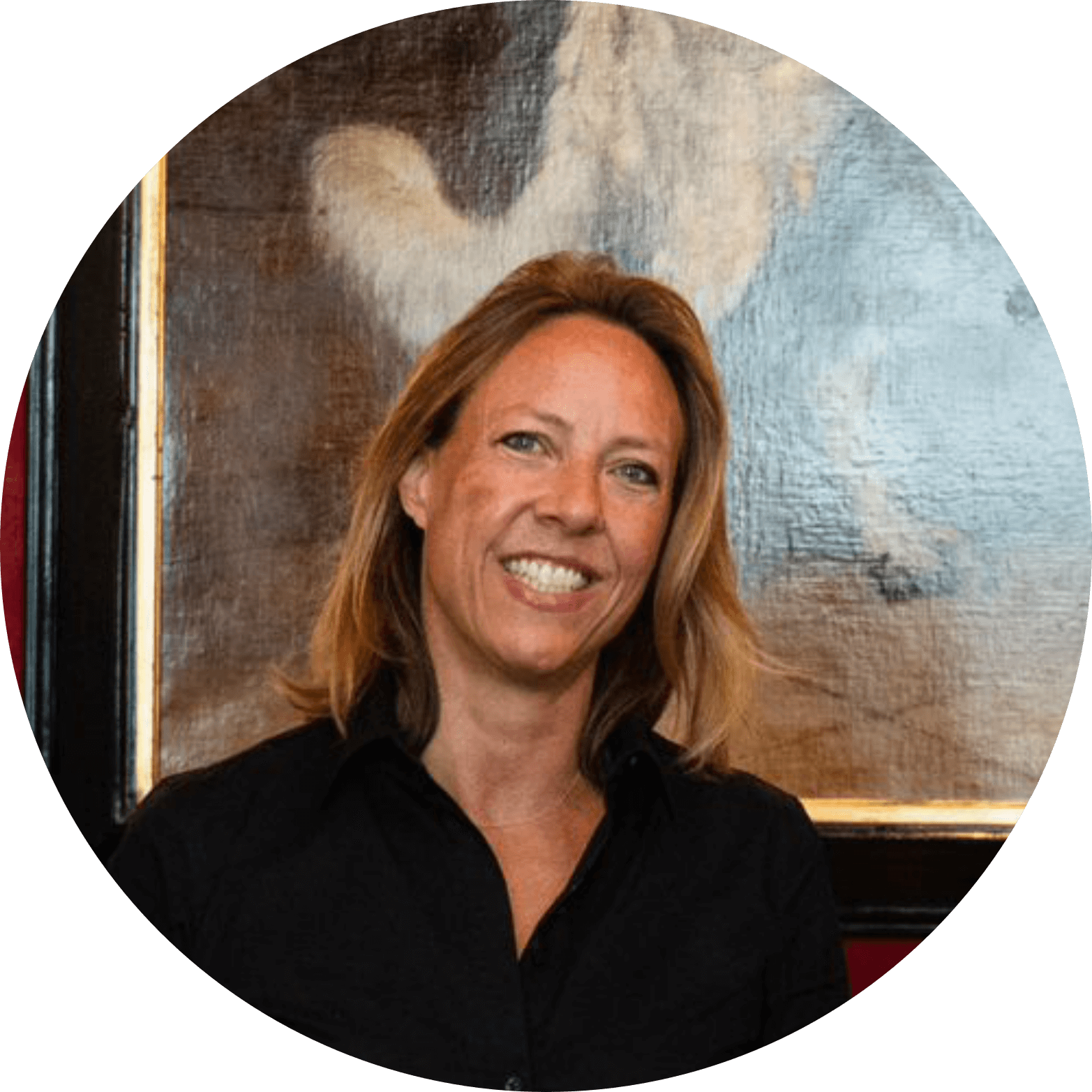SPARK CONVERSATIONS
A "Wiener Auszeit" with Alexandra Winkler
by Mark Alexander Grübbeling
September 15, 2025
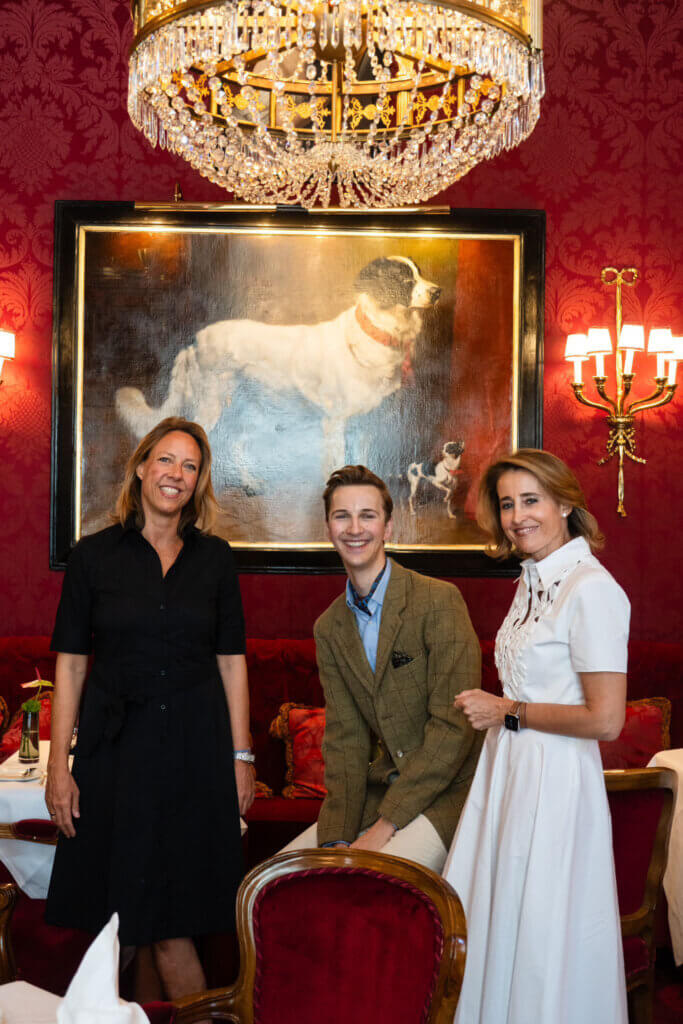
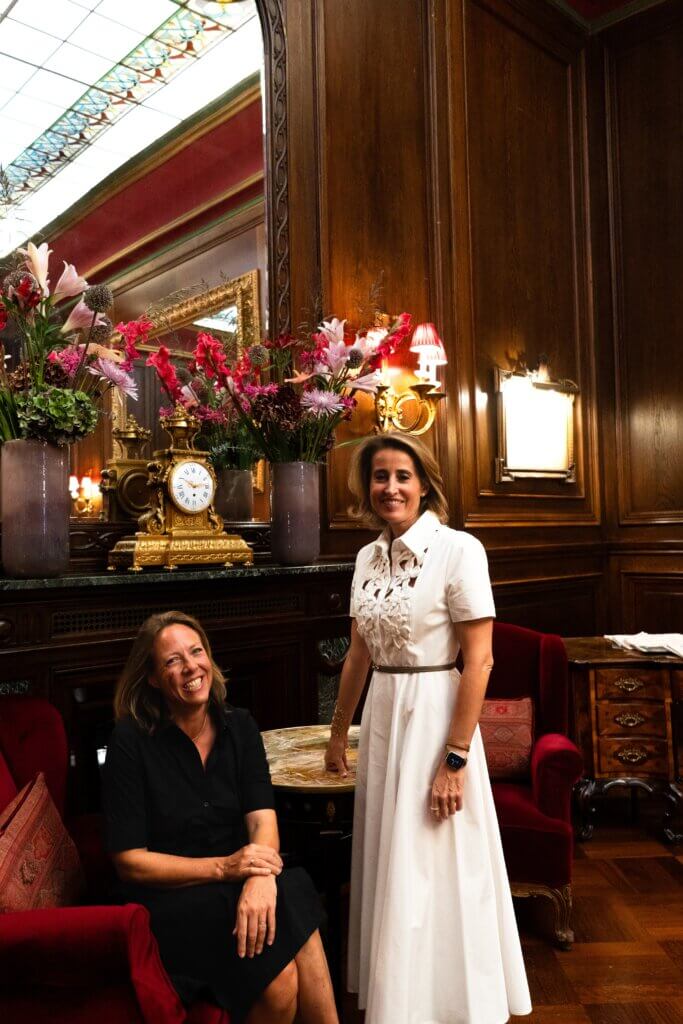
On a sunny Tuesday afternoon, my colleague Dania and I take a stroll down the bustling Kärntner Straße. We are headed to the SACHER. There, we have an appointment with Alexandra Winkler. Alexandra Winkler is the co-owner to one of Vienna’s, if not Europe’s, greatest treasures – the SACHER, a Gesamtkunstwerk that is constantly changing yet has always remained true to its heart. SACHER is the Viennese success story. It is characterised by the genius that, silently and inexplicably is at home in Vienna. Here, where they all came and went, here, where life becomes a work of art, we meet Ms Winkler at 12 noon sharp. We talk about memories, tradition, art and of course, the cake that turned the world upside down.
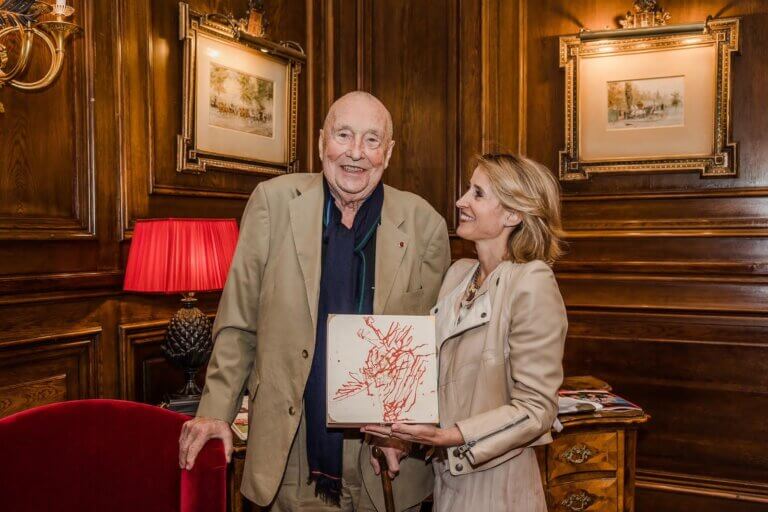
SPARK: Ms Winkler, when I was young I always received a Sacher-Torte from Vienna for my birthday. That’s how I got to know SACHER as a child. What the madeleine was to Proust, the Sacher-Torte is to me. When I think of Vienna, I think of SACHER. What do you think of?
Alexandra Winkler: I was born and grew up in Vienna and I’m very happy living in this city. When I think of Vienna, the first thing that comes to mind is, of course, the Hotel SACHER, which I’ve literally grown up with. My family has run it for decades and it’s a meeting point for both Viennese and travellers to exchange ideas about culture. It’s a place where stories, guests, and staff from all over the world come together. The Hotel SACHER is the perfect blend of hospitality, art, and history. The Vienna State Opera and the Albertina Collection are right next door. The Albertina Collection has a beautiful terrace that offers a fantastic view of the city. Just a few steps away is the Spanish Riding School. For me, the Spanish Riding School is the epitome of what Vienna is all about: living tradition and an absolute dedication to craftsmanship combined with discipline.
SPARK: The SACHER is a place full of history and stories. When friends visit me in Vienna, a visit to the SACHER is to be paid. To what extent is the past and tradition, an inspiration for your personal relationship with art? What role does tradition play in your life?
Alexandra Winkler: Gustav Mahler once said, “Tradition is the passing on of the flame, not the worship of the ashes.” For us, tradition means passing on the flame. The SACHER doesn’t stand still in the past; it lives its inspiration and responsibility towards its heritage, but also towards the present and the future. We try to keep our cultural heritage alive while remaining open to new things. Art and culture help to build bridges between the past and the present.
For me personally, art is a silent companion in my everyday life – it inspires, makes me think, sometimes helps me to see things from a different perspective, and it’s an antidote to the mundane.
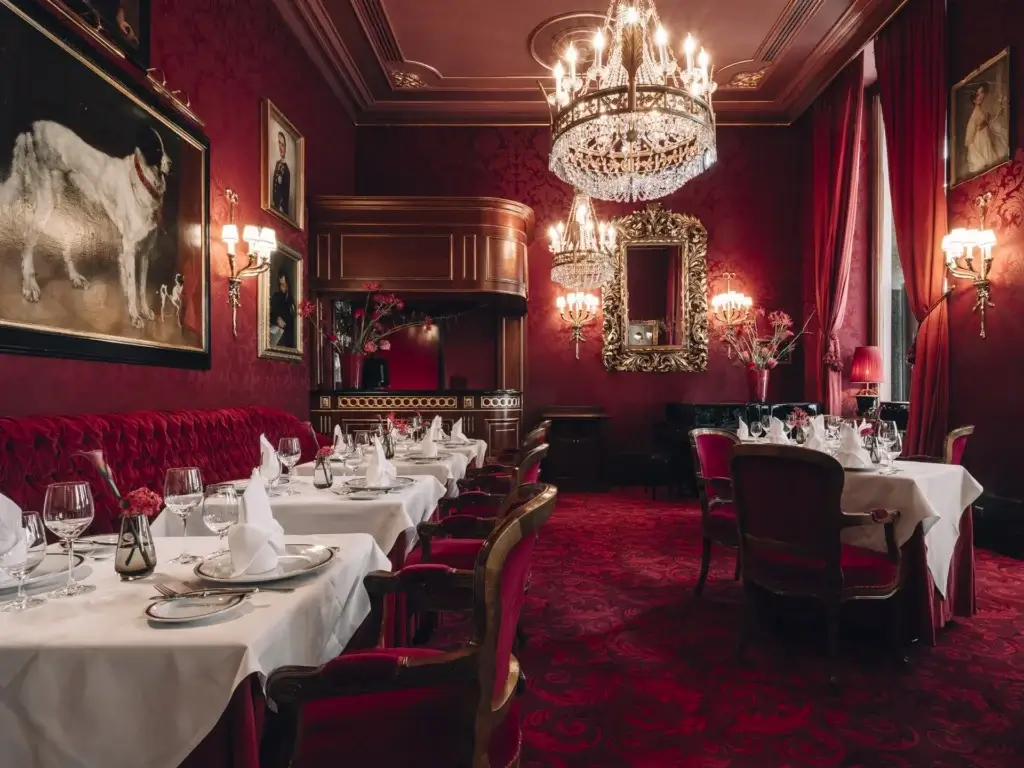
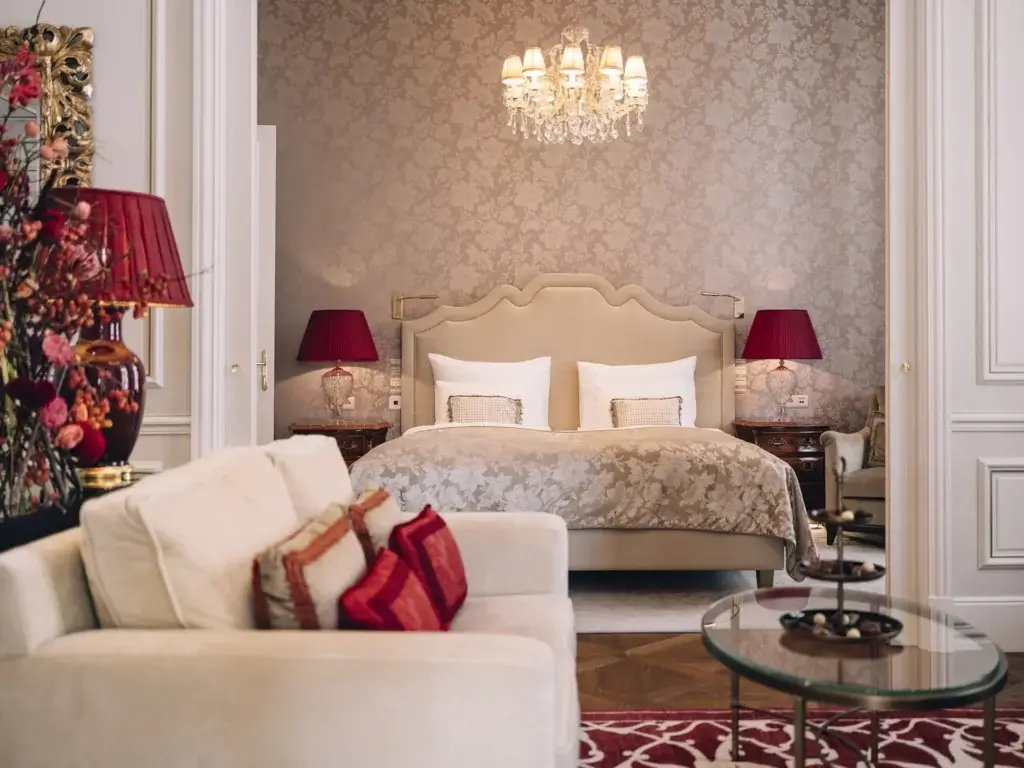
SPARK: The hotel is a Gesamtkunstwerk. It has a certain magic that can be felt, but never fully defined. For you, it’s a daily life; for most guests, it’s just a wrinkle in time. The first time I entered the SACHER, it was just before Christmas, I was completely enchanted. I felt as if I was stepping into Tchaikovsky’s Nutcracker, to live in a fairy tale. What do you think creates this magic?
Alexandra Winkler: I’d describe the magic as the interaction of atmosphere, history and the heartfelt hospitality shown by every single one of my colleagues. It’s the warm welcome from our concierge at the hotel entrance, the clinking of the porcelain at breakfast, the piano music in the Red Bar in the evening, the scent of an Original Sacher-Torte and a Viennese Melange in our Café Sacher. It’s the many individual moments and interactions between the guest and our team that are designed to make guests feel that at the SACHER, they’re not just staying and eating, but consciously experiencing unique moments.
SPARK: In addition to the SACHER name, Vienna is also famous for its music and art. It’s the city of great geniuses. In your opinion, what makes Vienna so special for the art and culture scene?
Alexandra Winkler: Vienna is one of the world’s leading cultural centres – the city combines an impressive history with a vibrant present. I’d say that here, culture isn’t just an “event,” it’s a part of daily life. Whether it’s opposite the Vienna State Opera, where something different is performed every day, or in the Albertina, or along the Vienna Ring Road, or in a typical Viennese coffee house, the art, culture, and history of this city can be felt everywhere. That’s what makes Vienna so special in my eyes.
SPARK: The Vienna you’re describing was also the Vienna of Stefan Zweig. It’s also the Vienna that I love. In his The World of Yesterday, Stefan Zweig also writes: “Tradition is also a hindrance.” How do you integrate modern and contemporary art into such a traditional environment without compromising the essence of the hotel? Is it a conscious balancing act?
Alexandra Winkler: At the SACHER, we don’t see tradition as a rigid monument, but as a living foundation that creates space for innovation and allows us to rethink values, attitudes, and stories. So, in that sense, tradition is also an inspiration.
Art has always played a central role at the Hotel Sacher – even when the hotel was founded, many artists were our guests. It was Anna Sacher who later began to collect the first artworks for the hotel, often asking for an artwork from a young artist instead of payment for their accommodation or meals. So, we don’t just see art at the Hotel Sacher as a decoration in our rooms, but as a part of our identity.
For me, art and the hotel industry have a few things in common: both create experiences and atmosphere, and both tell stories. So, when you deliberately incorporate art into a hotel, it gives the hotel a very special character and, in my opinion, makes it unique.
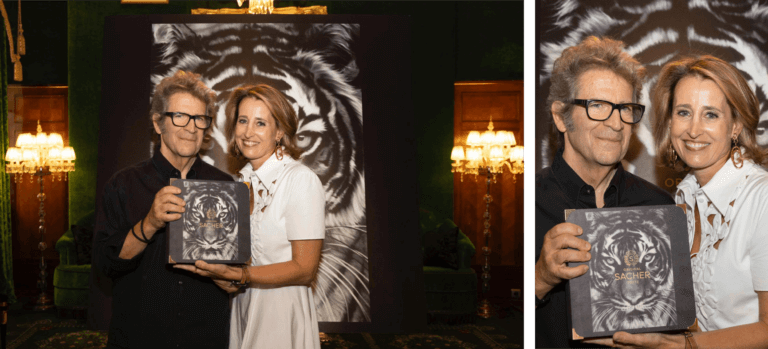
With the SACHER Artists’ Collection, we have deliberately chosen a way of bringing contemporary art into a dialogue with the history of our hotel. Every year, a special edition of the Original Sacher-Torte is released, for which a well-known artist designs the wooden box. In doing so, we’re also doing something good, as the entire proceeds from the sale go to a social project. Every artist in this collection has interpreted the Hotel Sacher from their own, modern perspective. This curated balancing act is intentional: it allows for friction, it creates new perspectives without betraying the essence of the hotel. It makes the SACHER visible in a new way and shows once again that tradition and the present don’t have to be a contradiction.
SPARK: SPARK has established itself as an important platform for contemporary art in Austria. What significance do you attach to art fairs in making art accessible to a wider audience?
Alexandra Winkler: Formats like SPARK make an important contribution to making contemporary art more visible and accessible. I think it’s important that art doesn’t just take place in a closed room, but that it meets people on an equal footing – regardless of their prior knowledge or background. SPARK creates exactly this kind of openness. It brings artists, galleries, and an interested public into a dialogue.
SPARK: What criteria are decisive for you when you buy a new piece of art for your collection? What was the first piece of art you ever bought?
Alexandra Winkler: I rely on my intuition – the first glance, the feeling you get when you see a piece for the first time and it “speaks” to you, so to speak, you enter into a “relationship” with an artwork. Of course, I also pay attention to the craftsmanship and an artistic language, but the most important thing for me is that it moves me emotionally, as I said. I mainly buy art when a piece moves me – when it triggers something in me that is not so easy to put into words, but, of course, the relationship with the artist or gallerist also plays a major role – it creates trust and often a very personal connection to the work.
My first piece of art isn’t a special one. My husband and I were in a gallery in Vienna and we were drawn to a piece by a very young but still unknown painter who studied under Markus Prachensky. It was an incredibly powerful piece for us, dominated by the colour red.
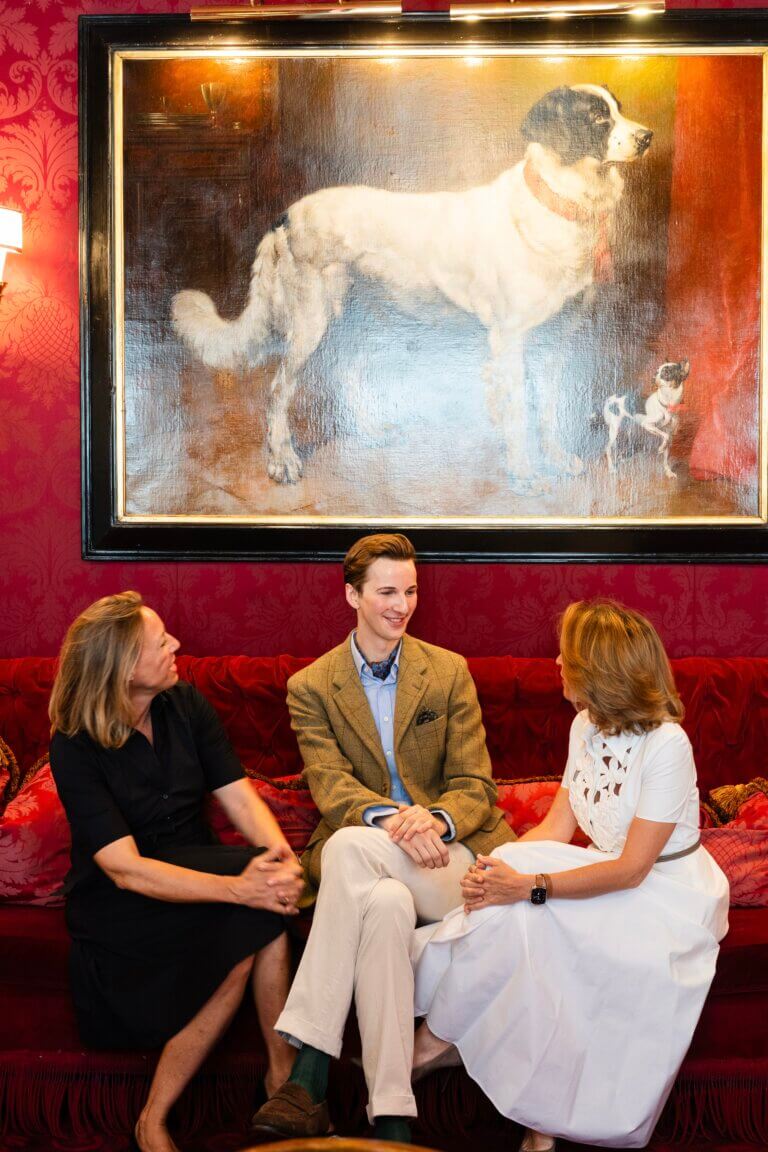
SPARK: The colour red always makes me think of your Rote Bar. When I think of the Rote Bar, I also think of Anna Sacher. Anna Sacher was a real powerhouse, known for her legendary salon. I imagine her smoking a cigar, embroidering and filling the room with her charisma and brilliance. Today we call that multi-tasking, perhaps a little like in Dana Schutz’s work Swimming, Smoking, Crying. Are you keeping the tradition of the salon alive? Which Viennese salon would you have liked to have attended? Who would you like to invite to your salon?
Alexandra Winkler: The salon was always more than just a room – it was a spiritual place: open, curious, full of conversations, opinions, and charm. Thanks to Anna Sacher, this tradition is deeply embedded in the SACHER DNA and yes, I try to keep it alive in my own way. Not in the form of a weekly literary circle, but through encounters, through exchanges, through the conscious creation of an atmosphere where people and ideas can truly meet.
Which historical Viennese salon would I have liked to have attended?
Probably Alma Mahler’s – if only for the mix of music, heated debate, and joie de vivre. And who would I like to invite to my own salon today? People with character, wit, and perspective – artists, thinkers, hosts. Those who don’t have to be loud to have something to say.
SPARK: Is there a specific art project or collaboration in the context of the Hotel Sacher that you would like to see happen in the future?
Alexandra Winkler: The Hotel SACHER will be celebrating its 150th anniversary in 2026 – for this, I’d like a special art project that makes the close relationship between art, culture, and the Sacher visible in a new way. For me, this anniversary isn’t just an opportunity to look back, but also an opportunity to look to the future – and to show that the Hotel Sacher not only preserves history, but also opens up to contemporary perspectives. I’d very much like to find an artist who understands the essence of this hotel – with sensitivity, depth, and perhaps with a wink.
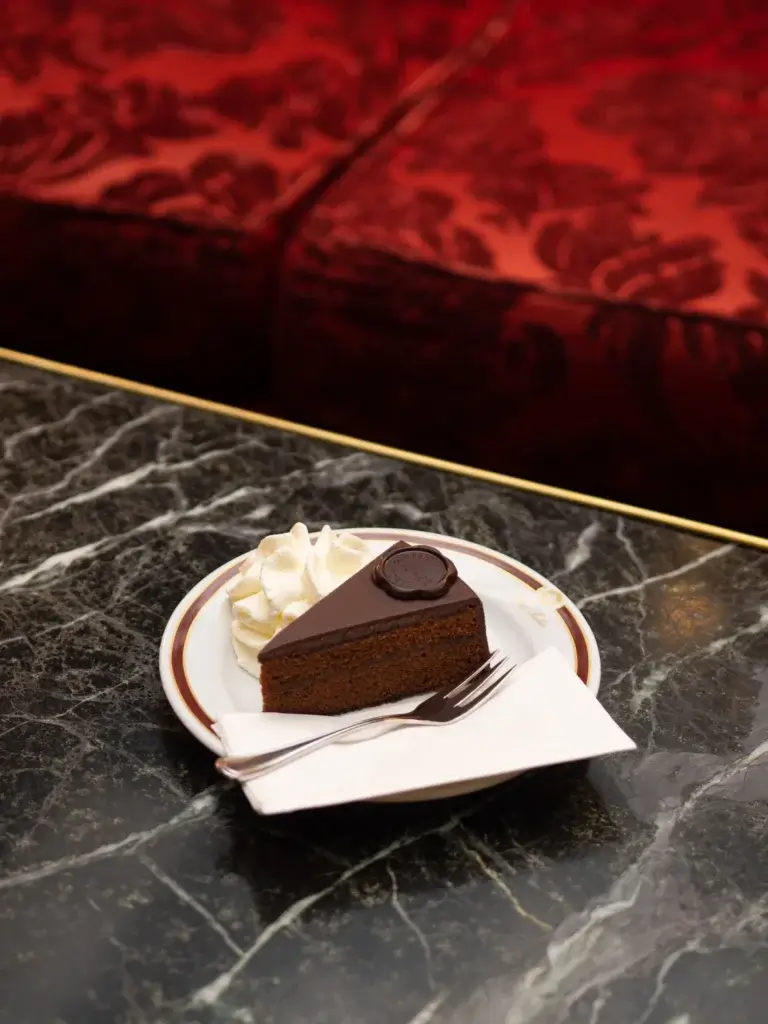
SPARK: I can, with a wink, recommend SPARK to you in your search for such an artistic figure. For me, the Sacher-Torte, in addition to its role as my “madeleine de Proust”, is also my favourite cake. My week often ends, on a Sunday after the opera, with a Sacher-Torte and a heated debate about the production. What’s your favourite cake?
Alexandra Winkler: I love chocolate and so my heart naturally beats for the Original Sacher-Torte. Not just because of the taste, but also because of its very special history. It was created in 1832 by the then 16-year-old Franz Sacher, who was an apprentice at the court of Prince Metternich. To this day, it’s still made by hand in 34 steps according to this secret recipe. I prefer to eat it with unsweetened whipped cream and a good cup of Sacher tea… my perfect “Wiener Auszeit.”

Alexandra Winkler
Owner and Managing Director Hotel Sacher

Mark A. Grübbeling
Communication & Social Media SPARK Art Fair

